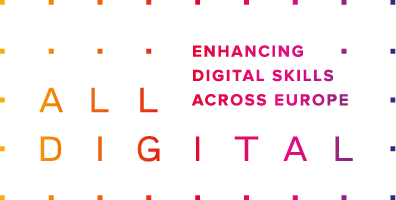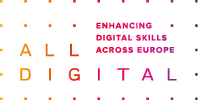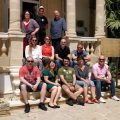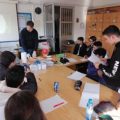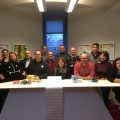
01 Feb CODINC – Coding for Inclusion
01 Feb, 2018
Hashtag used for following project news #CodincEU
The “Coding for Inclusion” aimed at fostering STEM education of disadvantaged youth through an inclusive educational approach based on a peer-learning pedagogical method for formal and non-formal educational contexts in Europe.
The project adapted, disseminated and scaled up a inclusive learning good practice based on the Capital Digital project, implemented by project partner and ALL DIGITAL Member MAKS in Brussels, Belgium. Capital Digital successfully trained 15-18 year old youngsters from disadvantaged backgrounds, migrants and asylum seekers on how to teach coding and programming to their younger 10-12 year old peers in Brussels. The young “e-facilitators” learned to engage children in STEM and coding activities in a playful way. This first work experience enhanced the youngster’s confidence when starting their careers and finding a job. Moreover, the project effectively supported young people to develop critical thinking, creativity, digital and collaborative skills, and science capital. Most importantly, the Capital Digital peer-learning pedagogical method had a strong inclusive potential and had fostered the STEM education and the inclusion of disadvantaged students both inside and outside the classroom.
The “Coding for Inclusion” project adapted the Capital Digital methodology and training programme to different contexts and planned to apply them in 5 European countries, namely Belgium, Cyprus, Germany, Italy and Spain.
TARGET GROUPS
- Primary school students (10 to 12 years of age) and secondary school students (15 to 18 years of age), in particular from disadvantaged areas;
- Primary and secondary school teachers;
- Parents;
- Trainers working with young people (e-facilitators, youth workers, etc.) in formal, non-formal and informal settings (schools, telecentres, youth centres, NGOs, training centres etc.);
- Key stakeholders from formal and non-formal environments: families, youth organisations, civil society organisations, local communities, NGOs, educational institutions and learning providers, public authorities, policy makers, business, etc.
PROJECT OBJECTIVES
- Increase and improve teachers’ and trainers’ capacity to foster the STEM education of disadvantaged youth through an inclusive educational approach based on peer-learning.
- Empower disadvantaged young people in the acquisition and development of IT and collaborative competences as well as problem solving, self-confidence and creativity through a peer-learning training programme on Coding.
- Foster the development of a European “Coding for Inclusion” learning community among different actors and across different sectors (formal and non-formal education and training) able to sustain project results and amplify their impact.
PROJECT OUTCOMES
- The methodology – explaining how to engage students through a stimulating pedagogical methodology, specifically how secondary school students (aged 15 and over) can teach basic coding and STEAM education to their younger peers, pupils aged 8-12 years.
- The training toolkit – we organised a 10-hour training for students of a secondary school. Every trained student worked with 5 pupils during 5 sessions from 2 hour each. The teachers of the secondary school were trained together with their students.
- 150 students in 5 countries were trained to teach coding to their younger peers;
- 150 students in 5 countries have gained 4 weeks work experience (which was first time for most of them);
- 480 pupils in 5 countries have learned the basics of coding, robotics and making apps in a playful way;
- 36 teachers in 5 countries were trained to develop coding activities in their schools.
After the first phase of the CODINC piloting activities and after receiving feedback from our partners, we can say that the project effectively helps young people develop their critical thinking, creativity, digital and collaborative skills and scientific capital. Most importantly, the peer learning pedagogical method has a high potential for inclusion and promotes STEM education and the inclusion of disadvantaged students inside and outside the classroom.
PARTNERS
- ALL DIGITAL, Belgium – Coordinator
- Media Action Kureghem City (MAKS vzw), Belgium
- Colectic, Spain
- Cyprus Computer Society (CCS) , Cyprus
- HELLIWOOD MEDIA & EDUCATION AT FJS E.V. (21ST CCC), Germany
- University of Naples Federico II (Universita degli Studi di Napoli Federico II (UNINA), Italy
- eduCentrum vzw (eduC), Belgium
